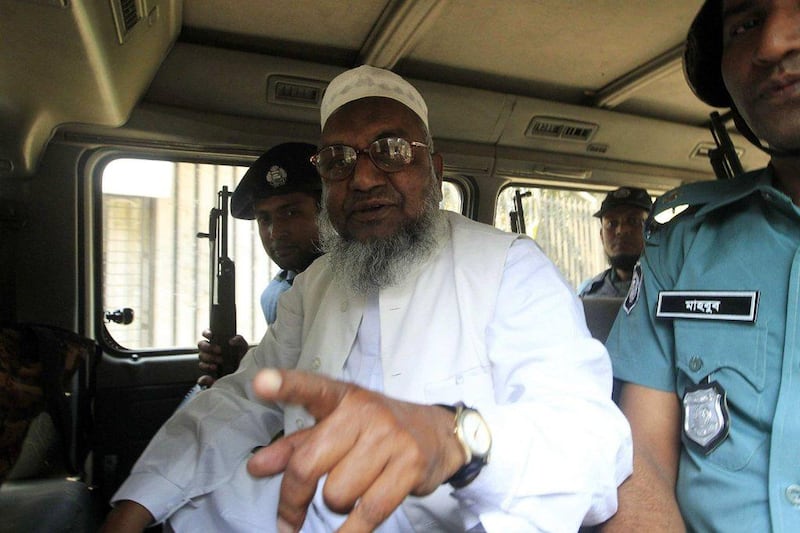DHAKA // Bangladesh’s Supreme Court sentenced a leader of an opposition political party to death for committing crimes against humanity during the nation’s 1971 independence war against Pakistan.
The Jamaat-e-Islami party leader Abdul Quader Mollah, 65, was found guilty by a special war crimes tribunal in February and sentenced to life in prison. That sentence was appealed by both the defence and prosecution.
A five-member panel headed by Chief Justice M Muzammel Hossain decided on Tuesday that Mollah be put to death for his role during the war. Mollah was convicted of rape, murder and mass murder including the killing of more than 350 Bengali civilians, a poet and a top journalist during the war when he was a physics student at Dhaka University.
Prosecutors described him as the “Butcher of Mirpur”, a Dhaka suburb where he committed most of the atrocities.
Mahbubey Alam, the top law enforcement official, said this was the final verdict and there was no option for another appeal. He said Mollah’s family can seek presidential clemency.
The defence lawyer Tajul Islam said: “We are stunned by the verdict. This is the first time in South Asian judicial history that a trial court sentence has been enhanced by a Supreme Court.”
Mr Islam said the defence would seek a review of the verdict in their final attempt to avoid hanging, which the prosecution said could be carried out this year.
Hours after the verdict, Mollah’s party said it would enforce a 48-hour general strike beginning on Wednesday morning across the country to denounce the ruling. Somoy TV station reported Jamaat-e-Islami’s student wing activists torched a police car and smashed another car in Chittagong while protesting the verdict. No injuries were reported.
“There were about 2,000 Jamaat protesters. They rioted, torching a police van and a private car,” local police chief Mohammad Mohiuddin said, adding police fired rubber bullets and tear gas.
Mollah and his supporters say the case against him is politically motivated. Mollah’s party is a key ally of the country’s main opposition Bangladesh Nationalist Party headed by the former prime minister Khaleda Zia, an archrival of the current prime minister, Sheikh Hasina.
Ms Hasina formed the special tribunal in 2010 to try war crimes suspects. Bangladesh says Pakistani soldiers, aided by local collaborators, killed 3 million people and raped 200,000 women during the nine-month war.
Ms Zia has accused the government of using war crimes trials as a guise to weaken the opposition. The government denies the allegation and says it rose to power in 2008 with the prosecution of war crimes suspects as one of its key election pledges.
Several other top leaders of Jamaat-e-Islami have since been convicted of similar charges.
The government says the trials are being held at an international standard, but the New York-based Human Rights Watch has raised questions about the impartiality of the tribunal.
The earlier sentence against Mollah led to protests across the country by supporters as well as those who said the sentence was too lenient.
* Associated Press with additional reporting by Agence France-Presse





